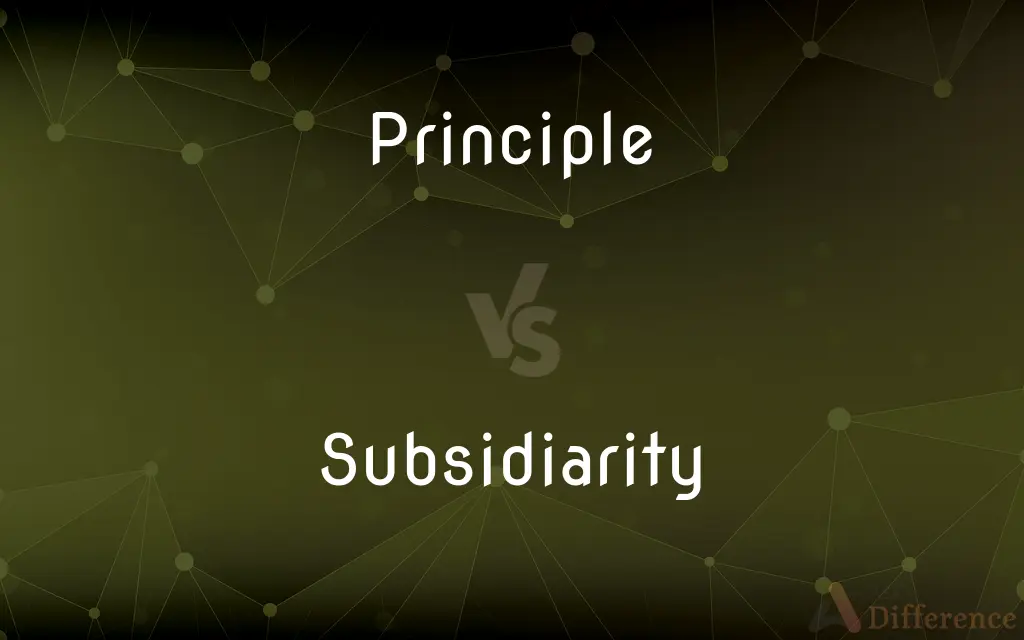Principle vs. Subsidiarity — What's the Difference?
By Urooj Arif & Fiza Rafique — Updated on April 1, 2024
A principle is a fundamental truth or proposition serving as the foundation for belief or action, while subsidiarity is a principle advocating that matters ought to be handled by the smallest, least centralized competent authority.

Difference Between Principle and Subsidiarity
Table of Contents
ADVERTISEMENT
Key Differences
Principles are core beliefs or guidelines that inform decisions and actions within various contexts, including moral, legal, and philosophical domains. They serve as foundational elements that guide behavior and decision-making processes. Subsidiarity, on the other hand, specifically refers to a principle within social organization advocating for decisions to be made at the most local level possible, only involving higher authorities when necessary.
While principles can be broad and varied, encompassing concepts such as justice, equality, and freedom, subsidiarity focuses on the organization of society and governance. It suggests that higher authorities should support lower ones, intervening only when the latter cannot effectively address issues themselves. This principle is often applied in political, social, and religious contexts, notably within the Catholic Church's social teaching and the European Union's governance.
Principles function as overarching truths that can be applied in diverse situations to guide ethical conduct, decision-making, and policy development. Subsidiarity, as a principle, provides a framework for determining the appropriate level of authority for decision-making, emphasizing empowerment and efficiency at the local level.
The application of principles varies widely, reflecting fundamental values within different cultures, organizations, and individual belief systems. Subsidiarity, while a specific principle, offers a method for structuring authority and responsibility in a way that is closest to those affected by decisions, aiming to enhance autonomy and effectiveness.
Both principles and subsidiarity contribute to the shaping of personal, organizational, and societal values and actions. However, subsidiarity uniquely highlights the balance between autonomy and support, ensuring that decisions are made as closely as possible to the level of impact, within the broader spectrum of principles guiding social and organizational conduct.
ADVERTISEMENT
Comparison Chart
Definition
A fundamental truth guiding beliefs or actions
A principle that decisions should be made at the most local level possible
Scope
Broad and varied across contexts
Specific to the organization of authority and decision-making
Application
Ethical conduct, decision-making, policy development
Structuring of societal, political, and organizational governance
Key Concepts
Justice, equality, freedom
Decentralization, autonomy, empowerment
Examples
Human rights, the principle of nonviolence
Local governance, the Catholic Church's social teaching, EU governance policies
Compare with Definitions
Principle
A foundational belief that guides actions and judgments.
The principle of fairness underpins many legal systems.
Subsidiarity
The principle that social and political issues should be dealt with at the most immediate level that is consistent with their resolution.
Subsidiarity supports local decision-making in education policy.
Principle
Basic or general laws that are used as a basis for making decisions.
Environmental protection principles guide sustainable development policies.
Subsidiarity
A governance principle emphasizing the importance of lower authority levels in decision-making processes.
In subsidiarity, community councils play a crucial role in urban planning.
Principle
Fundamental truths that inform ethical behavior.
Nonviolence is a guiding principle for many peace movements.
Subsidiarity
The doctrine that central authority should have a subsidiary function, performing only tasks which cannot be performed effectively at a more immediate or local level.
Subsidiarity in environmental regulation promotes regional conservation efforts.
Principle
Theoretical bases for a system of thought or behavior.
The principles of democracy are liberty, justice, and equality.
Subsidiarity
A principle in Catholic social teaching that holds higher levels of organization should support, not replace, lower levels.
Subsidiarity influences how the Catholic Church addresses social services.
Principle
Rules or laws considered to be governing works of thought or the operation of something.
The principle of supply and demand affects market prices.
Subsidiarity
A policy principle in the European Union dictating that actions should be taken as closely as possible to the citizen.
The EU applies subsidiarity in managing cross-border issues while empowering member states.
Principle
A principle is a proposition or value that is a guide for behavior or evaluation. In law, it is a rule that has to be or usually is to be followed.
Subsidiarity
Subsidiarity is a principle of social organization that holds that social and political issues should be dealt with at the most immediate (or local) level that is consistent with their resolution. The Oxford English Dictionary defines subsidiarity as "the principle that a central authority should have a subsidiary function, performing only those tasks which cannot be performed at a more local level".
Principle
A fundamental truth or proposition that serves as the foundation for a system of belief or behaviour or for a chain of reasoning
The basic principles of justice
Subsidiarity
The principle that initiative (whether in government, business or religion) ought to reside at the lowest feasible level (i.e. at the local or regional level, instead of the national or supranational level, unless the latter presents clear advantages)
Principle
A general scientific theorem or law that has numerous special applications across a wide field.
Subsidiarity
Secondary importance
Principle
A fundamental source or basis of something
The first principle of all things was water
Principle
A basic truth, law, or assumption
The principles of democracy.
Principle
A rule or standard, especially of good behavior
A man of principle.
Principle
The collectivity of moral or ethical standards or judgments
A decision based on principle rather than expediency.
Principle
A fixed or predetermined policy or mode of action.
Principle
A basic or essential quality or element determining intrinsic nature or characteristic behavior
The principle of self-preservation.
Principle
A rule or law concerning the functioning of natural phenomena or mechanical processes
The principle of jet propulsion.
Principle
(Chemistry) One of the elements that compose a substance, especially one that gives some special quality or effect.
Principle
A basic source. See Usage Note at principal.
Principle
A fundamental assumption or guiding belief.
We need some sort of principles to reason from.
Principle
A rule used to choose among solutions to a problem.
The principle of least privilege holds that a process should only receive the permissions it needs.
Principle
Moral rule or aspect.
I don't doubt your principles.
You are clearly a person of principle.
It's the principle of the thing; I won't do business with someone I can't trust.
Principle
(physics) A rule or law of nature, or the basic idea on how the laws of nature are applied.
Bernoulli's Principle
The Pauli Exclusion Principle prevents two fermions from occupying the same state.
The principle of the internal combustion engine
Principle
A fundamental essence, particularly one producing a given quality.
Many believe that life is the result of some vital principle.
Principle
A source, or origin; that from which anything proceeds; fundamental substance or energy; primordial substance; ultimate element, or cause.
Principle
An original faculty or endowment.
Principle
Misspelling of principal
Principle
(obsolete) A beginning.
Principle
(transitive) To equip with principles; to establish, or fix, in certain principles; to impress with any tenet or rule of conduct.
Principle
Beginning; commencement.
Doubting sad end of principle unsound.
Principle
A source, or origin; that from which anything proceeds; fundamental substance or energy; primordial substance; ultimate element, or cause.
The soul of man is an active principle.
Principle
An original faculty or endowment.
Nature in your principles hath set [benignity].
Those active principles whose direct and ultimate object is the communication either of enjoyment or suffering.
Principle
A fundamental truth; a comprehensive law or doctrine, from which others are derived, or on which others are founded; a general truth; an elementary proposition; a maxim; an axiom; a postulate.
Therefore, leaving the principles of the doctrine of Christ, let us go on unto perfection.
A good principle, not rightly understood, may prove as hurtful as a bad.
Principle
A settled rule of action; a governing law of conduct; an opinion or belief which exercises a directing influence on the life and behavior; a rule (usually, a right rule) of conduct consistently directing one's actions; as, a person of no principle.
All kinds of dishonesty destroy our pretenses to an honest principle of mind.
Principle
Any original inherent constituent which characterizes a substance, or gives it its essential properties, and which can usually be separated by analysis; - applied especially to drugs, plant extracts, etc.
Cathartine is the bitter, purgative principle of senna.
Principle
To equip with principles; to establish, or fix, in certain principles; to impress with any tenet, or rule of conduct, good or ill.
Governors should be well principled.
Let an enthusiast be principled that he or his teacher is inspired.
Principle
A basic generalization that is accepted as true and that can be used as a basis for reasoning or conduct;
Their principles of composition characterized all their works
Principle
A rule or standard especially of good behavior;
A man of principle
He will not violate his principles
Principle
A basic truth or law or assumption;
The principles of democracy
Principle
A rule or law concerning a natural phenomenon or the function of a complex system;
The principle of the conservation of mass
The principle of jet propulsion
The right-hand rule for inductive fields
Principle
Rule of personal conduct
Principle
(law) an explanation of the fundamental reasons (especially an explanation of the working of some device in terms of laws of nature);
The rationale for capital punishment
The principles of internal-combustion engines
Common Curiosities
What does subsidiarity mean?
Subsidiarity is a principle suggesting that matters are best handled by the smallest, least centralized authority competent to address them.
What are the differences between principles and values?
Principles are fundamental truths that guide actions, while values are deeply held beliefs that influence personal and social priorities and behaviors.
What is a principle?
A fundamental truth or proposition that serves as the foundation for a system of belief or behavior, or for a chain of reasoning.
How do principles affect decision-making?
Principles guide decision-making by providing a framework of fundamental truths and ethical guidelines.
Why is subsidiarity important in governance?
Subsidiarity is important because it promotes efficiency and empowerment by ensuring decisions are made as close as possible to those affected by them.
Can the principle of subsidiarity be applied in business?
Yes, subsidiarity can guide organizational structure and decision-making in business, promoting autonomy and efficiency at lower levels of the organization.
Can a principle change over time?
While fundamental, principles can evolve with society's understanding and ethical development, reflecting broader changes in cultural and moral perspectives.
How does subsidiarity enhance local governance?
By empowering local authorities to make decisions, subsidiarity enhances responsiveness, accountability, and the tailoring of solutions to community needs.
Is subsidiarity only relevant in political contexts?
No, subsidiarity can also apply in social, religious, and organizational contexts, anywhere there is a hierarchical structure of authority.
How do principles and subsidiarity complement each other?
Principles provide a broad foundation for action and belief, while subsidiarity offers a specific guideline for organizing authority and decision-making effectively.
Share Your Discovery

Previous Comparison
Branch vs. Division
Next Comparison
Panel vs. SheetAuthor Spotlight
Written by
Urooj ArifUrooj is a skilled content writer at Ask Difference, known for her exceptional ability to simplify complex topics into engaging and informative content. With a passion for research and a flair for clear, concise writing, she consistently delivers articles that resonate with our diverse audience.
Co-written by
Fiza RafiqueFiza Rafique is a skilled content writer at AskDifference.com, where she meticulously refines and enhances written pieces. Drawing from her vast editorial expertise, Fiza ensures clarity, accuracy, and precision in every article. Passionate about language, she continually seeks to elevate the quality of content for readers worldwide.
















































